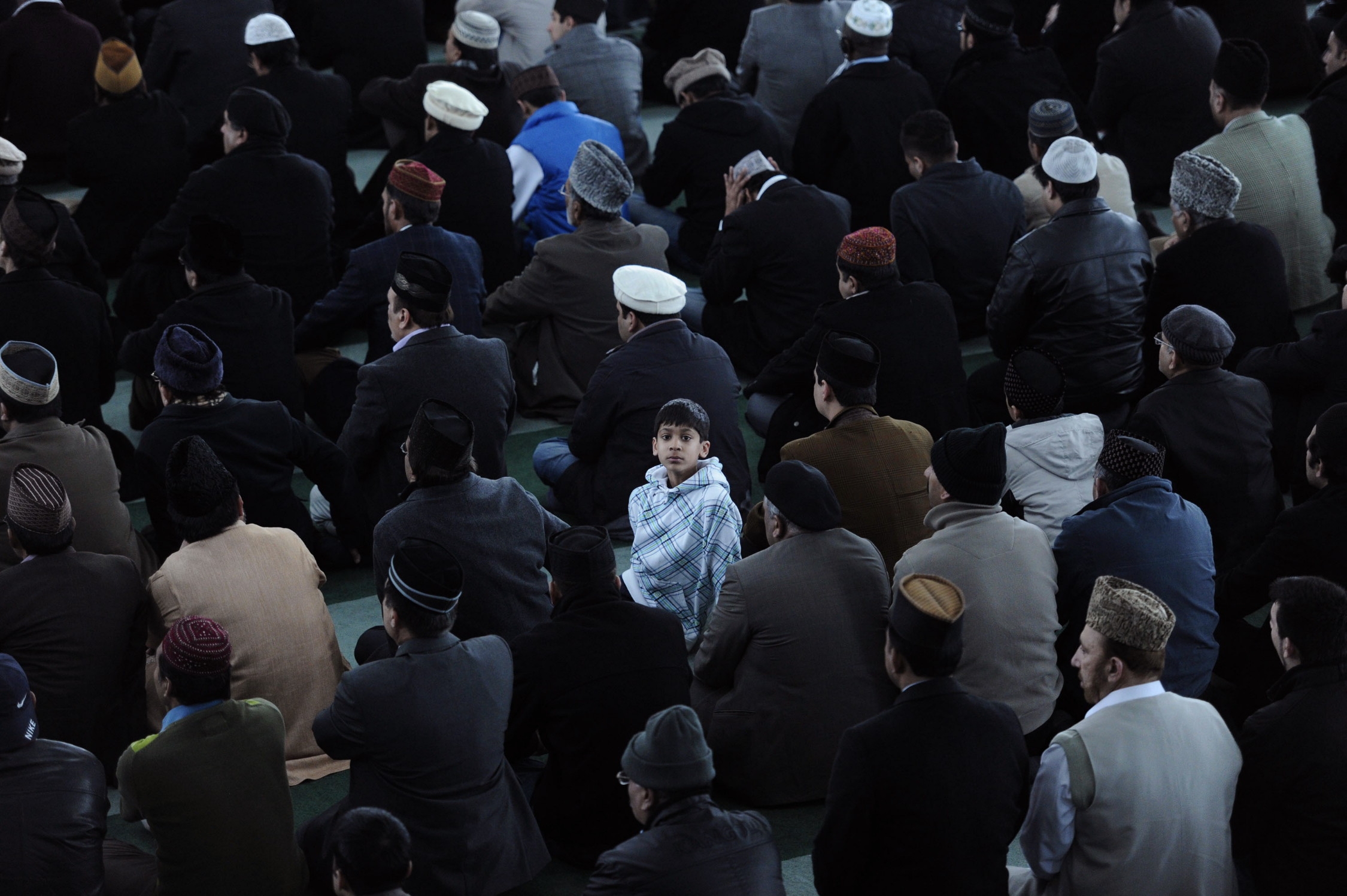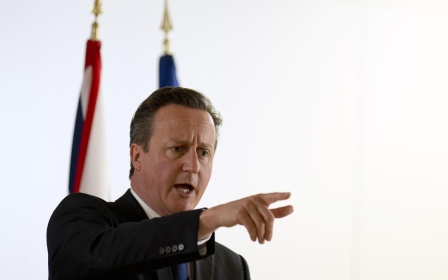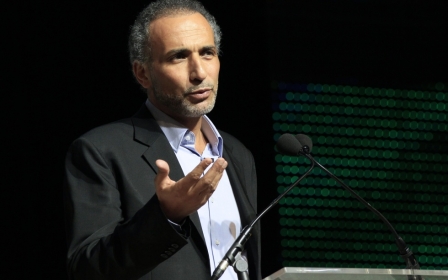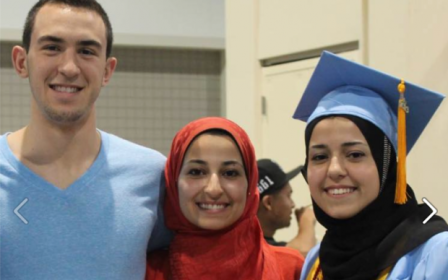British Muslims suffer Islamophobic ‘retribution’ for IS attacks

British journalist Zab Mustefa has some shocking stories to tell about Islamophobia in the UK, both from her own experience and from those she has interviewed.
Now based between Amman and Beirut, the Scottish-born women's rights specialist is no stranger to anti-Muslim abuse, and neither is her family.
"I have suffered abuse on and offline for my beliefs," she told Middle East Eye. "On Twitter, supporters of the EDL and other fascist groups threatened to rape me, even calling me a Muslim-slut (a tamer insult than other times), and another man threatened to come to my house and beat me up."
Mustefa said that in both instances she was told by police to ignore the abuse.
"Islamophobia has definitely worsened in the past five years," she added. "We have the likes of Britain First and UKIP constantly making Islamophobic or anti-immigration statements, which have hit the mainstream. These groups need people to blame and that obviously now falls on Muslims."
Attacks carried out by the Islamic State (IS) in Syria, Iraq and now Tunisia have a direct impact on Muslims living in other parts of the world, who quickly become the target of hate crimes and Islamophobia, a new study has found.
A new report written by Teeside University in the UK using data compiled by hate crime monitoring group Measuring Anti-Muslim Attacks (TellMAMA) shows that attacks by self-styled militant fighters lead to a spike in Islamophobic incidents, both online and in real life.
The nature of attacks overseas also changes the type of language used against Muslims.
TellMAMA director Fiyaz Mughal told MEE that there was direct correlation between IS activities being covered by the media and discussed on social media and the language of abuse suffered by British Muslims.
“We know that after the beheading of Alan Henning [the volunteer aid worker killed by Islamic State in Syria in September 2014] there was a correlating background noise with the ongoing language of hate. For example, we have an incident of a man saying to a Muslim woman ‘I am going to behead you’.
“That kind of rhetoric is coming from the Syria crisis, nowhere else but there. We have cases where there is a direct correlation with what is happening in Syria to what is said to members of the Muslim community in the UK.
“What are sadly seeing the fact that Syria is creating a constant reinforcement of key terms like extreme, terrorist, jihadi and beheading. There is rapidly changing language because of the international context.”
Mughal said that when the media was reporting on the child abuse scandal in Rotherham, many Muslims in the area were addressed as “paedophile”. Once attention shifted back to IS, the language changed and “terrorist” became the most common insult.
During the period March 2014 to February 2015, there were 548 confirmed reports of Islamophobic attacks made to TellMAMA and 729 in total, some of which could not be corroborated.
‘Cumulative extremism’
The report also looked at three specific attacks, Charlie Hebdo, Copenhagen and Sydney, which occurred in the past year. In all three cases there was a correlating increase in online abuse of Muslims and Islam.
Mughal told MEE that social media and the language used by journalists in reporting the attacks had a large role to play in the following spike in abuse.
The smallest increase came after the Sydney attack, with 10 reported incidents in the seven days before the siege and 12 in the following seven days.
This, the report found, could be attributed to media coverage of the event, which focused on the perpetrator's mental health issues rather than the fact he flew an ISIS banner. As a result, the links with Islam were covered in a more restrained fashion than the Copenhagen and Paris attacks and the fallout was less extreme.
“Press responsibility is really important,” Mughal said. “We didn’t have a massive impact from Sydney because the press commentary [shifted] early on to be about his mental health issues and so there wasn’t that bigotry that came out of it.
“If there is anything over-riding from this report it is that the press have a huge responsibility on how they're reporting and the impact it has on communities.”
In the case of the Charlie Hebdo attacks in Paris, the constant focus was on the attackers' links with Al-Qaeda in Yemen and their religious motivations. The seven days following the Paris shootings saw an increase from 12 incidents to 45.
This idea of tit-for-tat retribution is flagged in the report as "cumulative extremism".
“Perhaps the most striking aspect of the 2014/15 data was the phenomenon known as ‘cumulative’, or reciprocal, extremism… with acts of violence perpetrated by a sub-group (however small) of a given community against members of another community, triggering acts of violent retribution,” the report said.
Even the decrease in incidents on last year’s report, which had 734 confirmed incidents, can be linked to "cumulative extremism" following the murder of soldier Lee Rigby.
Women targeted
Families, and particularly women, who have moved from the Middle East could be the most vulnerable to attack as those wearing traditional clothing are targeted more often than not, the report found.
Of the confirmed physical attacks, women were the victims in the majority of cases, and in the vast majority of those real-world attacks, the victims reported that they were wearing Islamic clothing at the time. The attacks included 29 cases of verbal threats, 21 assaults and 15 incidents of damage to property. There were also seven incidents classed as “extreme violence”.
According to Mughal, it is likely that many women from the Gulf are the victims of abuse because they often wear the niqab, but verification of this is difficult as often the women do not know how or where to report the incidents.
Journalist Mustefa told MEE that women often don’t report incidents of abuse because of a lack of trust in the police.
“Women bear the brunt primarily because of the clothing they wear. Now, we’re more commonly hearing about deplorable incidents where a Muslim woman’s hijab or niqab is ripped off and unfortunately, many of these women don’t report such crimes to the authorities due to a lack of trust in the police,” she said in an email to MEE.
“Just the other week, photos were circulated on various media outlets of police officers laughing after a hijabi mother was assaulted and her scarf was ripped off in London. How can these women have trust when such things happen? I interviewed a Somali woman in London a while back who told me she was attacked by a group of men in broad daylight. Her niqab was ripped off, she was beaten and urinated on. I remember being shocked when she didn’t call the police for the same reasons.”
Scottish-born Mustefa and her family have also been the victims of attacks, both online and in the street.
“In person, I’ve been called Osama bin Laden, a terrorist-Paki and probably the most ridiculous slur, a Muslim sheep-shagger – which I actually laughed at. I had one guy arrested because thankfully the police were walking by as he shouted abuse at me in Glasgow."
"I only have to look at my own family to experience the anti-Muslim hate. Earlier this year, my disabled mother was verbally abused on a bus for wearing a headscarf. She was told to go back to her own country. How does that make us feel? Marginalised from society."
Online abuse is far more prevalent than attacks in the street, but as with street harassment, the majority of cases are not reported to the police.
Lack of trust
Of the 111 offline attacks referred to in the report, only 46 were reported to the police. In cases of online abuse, which include anti-Muslim literature, abuse of Islam, and some incidents of direct threats, only 186 of the 402 cases reported to TellMAMA were also reported to the police.
“Hardly anyone bats an eyelid when Muslims are attacked. You only need to look at the comments section on social media to see the derogatory things people say, and it’s totally the norm,” Mustefa said.
MEE contacted the Metropolitan Police for a comment, but had not received a reply by the time of publication.
This lack of trust, and unwillingness to report abuse to the police means that community groups play an increasingly essential role.
Head of community development and engagement at Mend, Azad Ali, said there was a certain amount of apathy when it came to hate-crime victims reporting events to the police.
“People see it as wasting police time, or wonder what the police can actually do. Added to that you have the lack of awareness raising in particular from the police, specifically reaching out to them and saying they do record Islamophobia incidents.”
Over the past two years, Mend has worked with police forces across the country, and now 11 constabularies do record Islamophobia as a specific attack.
“That’s really going to go a long way [toward ensuring] this is going to be treated as a crime, and there needs to be a concerted effort in awareness raising."
Institutional denial
However Ali says that there is denial within government about the rise of anti-Muslim prejudice. “I think there is a denial at an institutional level about Islamophobia. I have been working in this area for about 15 years and I remember a conversation with the Home Office in 2007 and they were in complete denial.
“You don’t see robust statements about Islamophobia from any ministers.”
TellMAMA's Mughal also thinks that a lack of political interest in fighting Islamophobia is part of the problem.
“Supporting work like TellMAMA’s doesn’t buy you a lot of votes; in some parts of the government, it will lose you votes, so what we see is that there’s no long-term strategy and committed support for this work, and that is what is needed to tackle the issues,” he said.
Not trusting the police, however, could have devastating consequences and eventually drive British Muslims into the hands of the Islamic State.
“There is a political agenda [to saying don’t trust the police]. Many Islamist groups are saying 'don’t give your data, don’t report incidents'.
“The problem is, if they keep up this narrative, that things are so terrible in the UK, that resonates with the ISIS jihadist mentality and reinforces them telling people to leave Europe because 'Europe doesn’t want you; come to Syria'.”
Middle East Eye propose une couverture et une analyse indépendantes et incomparables du Moyen-Orient, de l’Afrique du Nord et d’autres régions du monde. Pour en savoir plus sur la reprise de ce contenu et les frais qui s’appliquent, veuillez remplir ce formulaire [en anglais]. Pour en savoir plus sur MEE, cliquez ici [en anglais].




